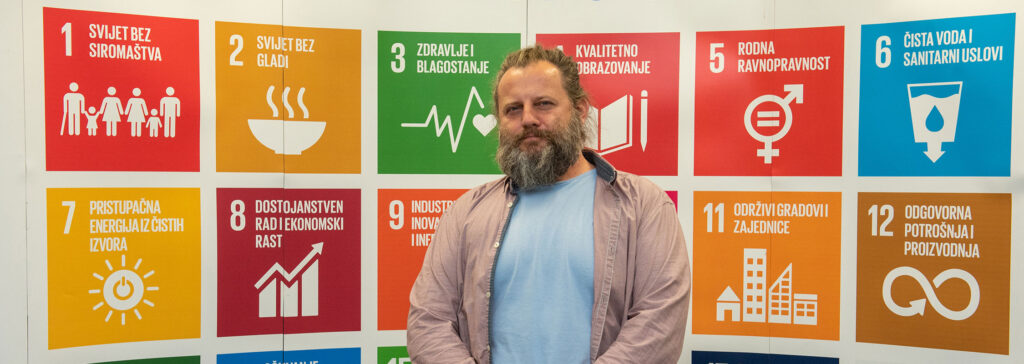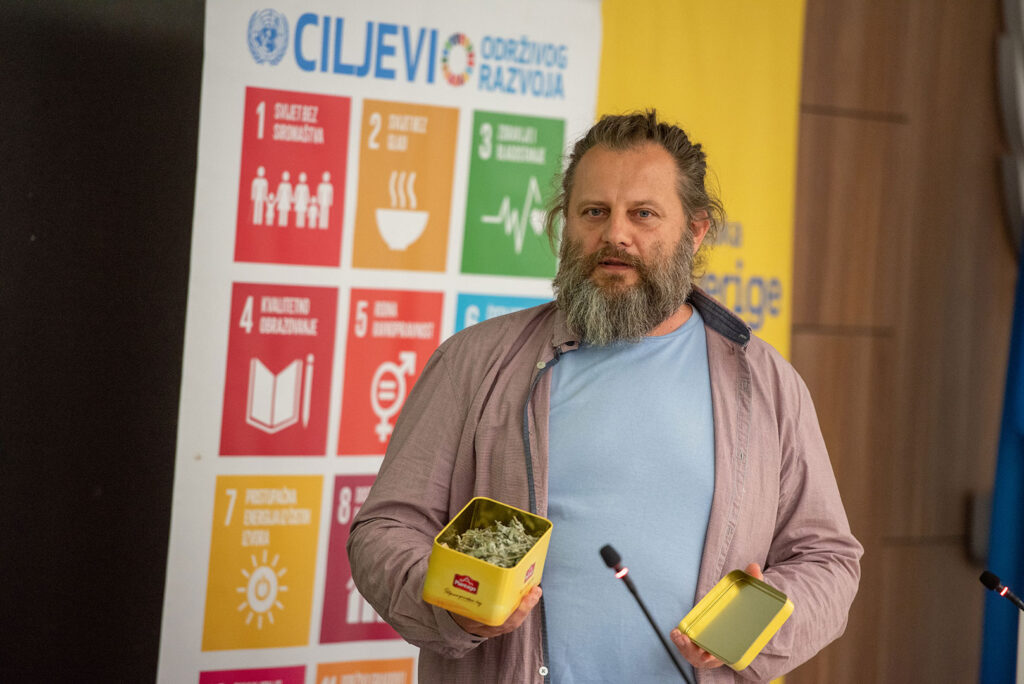[userpro template=login login_redirect=http://zamisli2030.ba/]
[userpro template=register register_redirect=http://zamisli2030.ba/]
Empowering small-scale herb growers and pickers while offering large assortment of quality teas and full customer experience through Čajana Tea Lab
Plantago is leveraging its extensive experience and innovative thinking to promote the empowerment of marginalized rural suppliers while sustaining its vision to offer the best tea to the market.
As one of the leaders in tea industry in Bosnia and Herzegovina, for over 20 years, Plantago has been specializing in tea production, including cultivation, purchase and processing of medical herbs and forest fruits. Throughout its long-standing experience, Plantago has been dedicating significant efforts in sustaining its vision and cherishing sense of identity by maintaining quality and reputation, whilst remaining loyal to its customers and reliable partner to its suppliers.
Having observed the industry behind tea production, Plantago has noticed that the current retail sector set-up within tea category is depriving small-size plant growers and pickers from locally selling unconventional varieties of herbs, thus from real value income earnings due to the unfair trade and lower prices of standard tea products across retail stores. For such reason, Plantago came up with an idea to support an empowerment of such marginalized group while offering its customers an experience of enjoying a large assortment of high quality teas.
‘As a predominantly dominant retail brand, Plantago has already grown to such an extent that it is a challenge for us to cooperate with small plant pickers and growers, because the quantities we need are rather large. Additionally, every day we witness a great number of customers who are picking what kind of teas they want to buy in supermarkets, thus being exposed to very cheap prices and various brands offering standardized variety of teas. That means that the person who grows and picks these herbs is unable to sell unconventional varieties that are not present in the retail mainstream and is practically paid nothing. Therefore, to uphold our company’s mission, we have decided to launch a new project called Čajana, a tea lab that will provide a visible space to accommodate a presentation of superb quality of teas and connect our suppliers with our customers. Apart from being a meeting point of our stakeholders, with its unique ambience, Čajana will enable users with the experience of enjoying a large assortment of finest teas, whilst stimulating fair trade and payment of premium prices for the premium quality of locally harvested herbal teas’, explains Aleksandar Vukmirović, Plantago founder and CEO.

Aleksandar Vukmirović
The Plantago team, standing behind Čajana brand will ensure that the entire value chain, from harvesting premium quality plants, cooperating with small growers and pickers, to processing and exclusive packaging is implemented and gets transparently communicated to its customers. Aleksandar explains:
‘We are aware that such a concept cannot be implemented overnight, hence we thoroughly considered our value proposition, supply chain, internal resources and capacity, as well as the needs of our existing and potential future customers. Čajana will not only focus on offering customers what they are looking for, but will also be a place for knowledge sharing. It will ensure the full experience drawn from the entire value chain, from the initial informative presentation on the origin of the herb and its benefits, identified grower and picker persona, appealing packaging, to the enjoyment of consuming tea in equally vivid ambience. It is also worth noting that we will continue building up on our key principle of maintaining quality and ensuring healthy offerings for our customers. Thus, in our
production process, we will only use natural ingredients, without the addition of preservatives, artificial flavors and colors, and will pack them in natural and biodegradable materials.’
In order to assure that its customers receive full experience and small rural suppliers are well recognized and empowered, Plantago will invest in building up a skillful and knowledgeable team that will coordinate all stakeholders as well as facilitate on-going customer relationships and brand development.
‘Through Čajana, Plantago employees will undergo a customer service training and will get an opportunity to develop and further enhance their knowledge about various herbs and teas. Such will enable them to provide an outstanding customer experience and be equipped with valuable skills to support the sustainable growth of small herb growers and pickers. This way, our team will ensure transparent cooperation and fair trade principles with our suppliers who will in turn, get a trusted partner to promote their empowerment and track their progress as they develop and achieve ever-increasing revenues’, emphasizes Aleksandar.

Apart from the ambient atmosphere, Čajana will also contribute to Plantago brand acting as a platform for research and marketing that will offer real life communication with customers and simultaneously drive the growth of Plantago as well. Aleksandar explains:
‘Čajana will be the hub for marketing communication and online presence for the Plantago, Čajana as well as our sister brand Biljna Pomoć. That way, we will satisfy vast customer preferences, offer product personalization choices, continue creating stories around Čajana concept and invest efforts on research and its further development.’
As such, the SDG Accelerator Programme was a rewarding opportunity to leverage Plantago’s long-lasting experience and innovative thinking to promote the empowerment of marginalized herb growers and pickers while sustaining its vision to offer the best tea to the market.
‘Through our participation in the SDG Accelerator Programme, we learned that what we have already planned to do for the wider community underpins this great concept of ensuring decent work opportunities and income earning for small growers and pickers, while stimulating sustainable supply and consumption of our end-users’, says Aleksandar.
So far, Plantago has been working on the conceptual design of Čajana Tea Lab and how to test the idea in order to identify the potential location and the concept for product offerings.
‘Until now, we have completed the conceptual interior and exterior design of Čajana, taking in consideration gathered experience and feedback from SDG Accelerator Programme facilitators and experts. The testing phase is in front of us and is planned to occur around springtime this year. We will test the packaging concept, herb and forest fruit types and flavors, along with the actual demand for particular herb sorts and most preferable location to set up our tea lab. Following the outcome of the testing phase, we expect to launch Čajana concept around autumn time, prior to which we will decide whether to proceed with the form of pop-up shops or larger physical facility. Nevertheless, we are very excited and we believe that with such innovative concept firstly to be implemented in Bosnia and Herzegovina, and later scaled-up to the neighboring countries, we will elevate our current market position and continue embracing our sustainability aspirations’, concludes Aleksandar.
 SDG 2: Zero hunger
SDG 2: Zero hungerTarget 2.3: By 2030, double the agricultural productivity and incomes of small-scale food producers, in particular women, indigenous peoples, family farmers, pastoralists and fishers, including through secure and equal access to land, other productive resources and inputs, knowledge, financial services, markets and opportunities for value addition and non-farm employment.
Job creation for small-scale herb growers and pickers.
Target 8.3: Promote development-oriented policies that support productive activities, decent job creation, entrepreneurship, creativity and innovation, and encourage the formalization and growth of micro-, small- and medium-sized enterprises, including through access to financial services.
Plantago has developed a concept of Čajana tea lab that will enable empowerment of small herb growers and pickers who are at the moment deprived from real value income earnings due to the unfair trade and lower prices of tea products across retail stores.
With Čajana serving as a meeting point for small growers, suppliers and customers, it will allow better understanding of the premium quality of freshly picked herbs that require premium purchase prices, thus contributing to the eradication of poverty, decent economic opportunities for disadvantaged growers and pickers, along with betterment of the wider community.